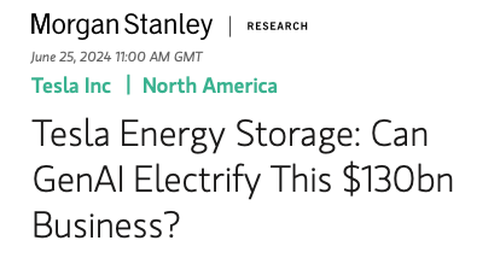Morgan Stanley’s Adam Jonas Says Tesla “May Hold Important Cards” In The Next AI Trade
Morgan Stanley’s Adam Jonas suggests that Tesla could be poised for the powering up America theme with its solar energy and storage business. This comes as artificial intelligence data centers are being constructed across the country, and once completed, demand a whole heck of a lot more power than traditional data centers, which means power grids must be upgraded to handle the new load capacity.
“At first glance, the rapid growth in AI and its impact on electricity demand may not seem to have relevance to Tesla or the broader auto industry,” Jonas wrote in a note to clients on Monday.
Titled “Tesla Energy Storage: Can GenAI Electrify This $130bn Business?” Jonas continued, “We recently published an analysis showing how US data center power usage may be equivalent to the power used by 150 million electric cars by 2030; the forecasted increase in US data center power from 2023 through 2027 is the electrical energy equivalent to adding 59 million EVs to US roads, or a 21% increase in total vehicles in service.”
The analyst then describes how Tesla’s energy generation (solar) and storage (Powerwall/Megapack) “may hold some important cards in the evolution of the US grid as energy usage of compute/data grows.”
Jonas seems to embrace ‘The Next AI Trade,’ a theme we introduced to our pro subscribers in early April. We outlined how the AI revolution will drive a significant increase in electricity demand from AI data centers, reshoring trends, and other electrification trends, necessitating an upgrade of the nation’s grid.
Here are some key points from Jonas’ note, which explains Tesla Energy will play a critical part in upgrading the nation’s power grid for the AI revolution, which justifies a $310 price target:
Tesla Energy Valuation and Forecasts:
Tesla Energy is valued at $36 per share, contributing significantly to Tesla’s overall market cap.
Revenue projections for Tesla Energy in FY24 are over $7 billion, with margins expected to surpass those of Tesla’s auto business by next year.
EPS contributions from Tesla Energy are estimated to reach $0.50 by 2026 and over $1 by 2030.
Impact of AI on Energy Demand:
AI acceleration is expected to spur a significant increase in energy demand, likened to the power usage of 150 million electric cars by 2030.
Data center power usage is projected to increase substantially, equating to the energy addition of millions of EVs on US roads.
Tesla’s Energy Products: Powerwall:
A 13.5 kWh lithium-ion battery pack for residential use, capable of storing solar or grid energy and providing power during outages. Solar Panels and Solar Roof:
Solar solutions for residential customers, with the Solar Roof integrating solar tiles directly into the roof structure.
Megapack: A large-scale battery storage solution for commercial and utility use, designed for easy installation and high energy density.
Tesla Energy’s Strategic Advantages:
Tesla’s capability in distributed energy generation (solar) and storage positions it to benefit from increasing energy demands driven by AI and data centers.
Innovations and scale in the energy storage market make Tesla a disruptive force against incumbent players.
Case Studies and Global Deployments:
Various case studies highlight Tesla Energy’s successful deployments, such as emergency backup systems for railways, energy savings for breweries, and large-scale renewable energy storage projects.
Tesla’s global footprint includes numerous installations across residential, commercial, and utility sectors.
Future Prospects and Challenges:
The report outlines a bull, base, and bear case for Tesla Energy, with varying revenue growth and margin expectations.
The storage business is expected to grow at a faster rate than the solar business, with significant contributions to Tesla’s overall profitability by 2030.
Tesla faces competition from other storage and solar companies but is positioned well due to its innovative products and integrated business model.
Regulatory and Market Dynamics:
Federal and state-level incentives, such as tax credits and rebates, support the adoption of Tesla’s energy products.
Changes in policies, like California’s net metering adjustments, further incentivize the use of energy storage paired with solar installations.
Strategic Vision and Market Position:
Tesla aims to scale its production capabilities rapidly, with ambitious growth targets for energy deployments.
The company’s integrated approach and focus on innovation are expected to drive substantial growth in the energy sector, positioning Tesla as a leader in the clean tech and energy storage market.
Here’s what X users are saying about Jonas’ note, plus their thoughts on Tesla Energy:
Don’t sleep on Tesla energy! It might be small now but it will be a major contributor long term!
— Ayden Miller (@AydenMMiller) June 25, 2024
This is the best product of Tesla. No drama, growing steadily year over year and no hype. And the potential is huge
— Leafr (@LeafrLilly) June 25, 2024
The energy business will be huge 👏
— Jake (@Jakeisfak3) June 25, 2024
Interesting perspective on Tesla’s role in the evolution of the US grid. Exciting potential!
— Debbie Martin (@DebbieMart91056) June 25, 2024
In markets, Tesla shares have been building a multi-year base.
Cathie Wood, head of Ark Investment Management, spoke with CNBC the other day about Tesla’s technical analysis and explained, “Longer the base, the bigger the breakout.”
The longer the base, the bigger the break out pic.twitter.com/iif4xS5f0s
— Teslaconomics (@Teslaconomics) June 25, 2024
However, we might want to remind everyone that breakouts can occur in either direction…
Tyler Durden
Wed, 06/26/2024 – 07:20

